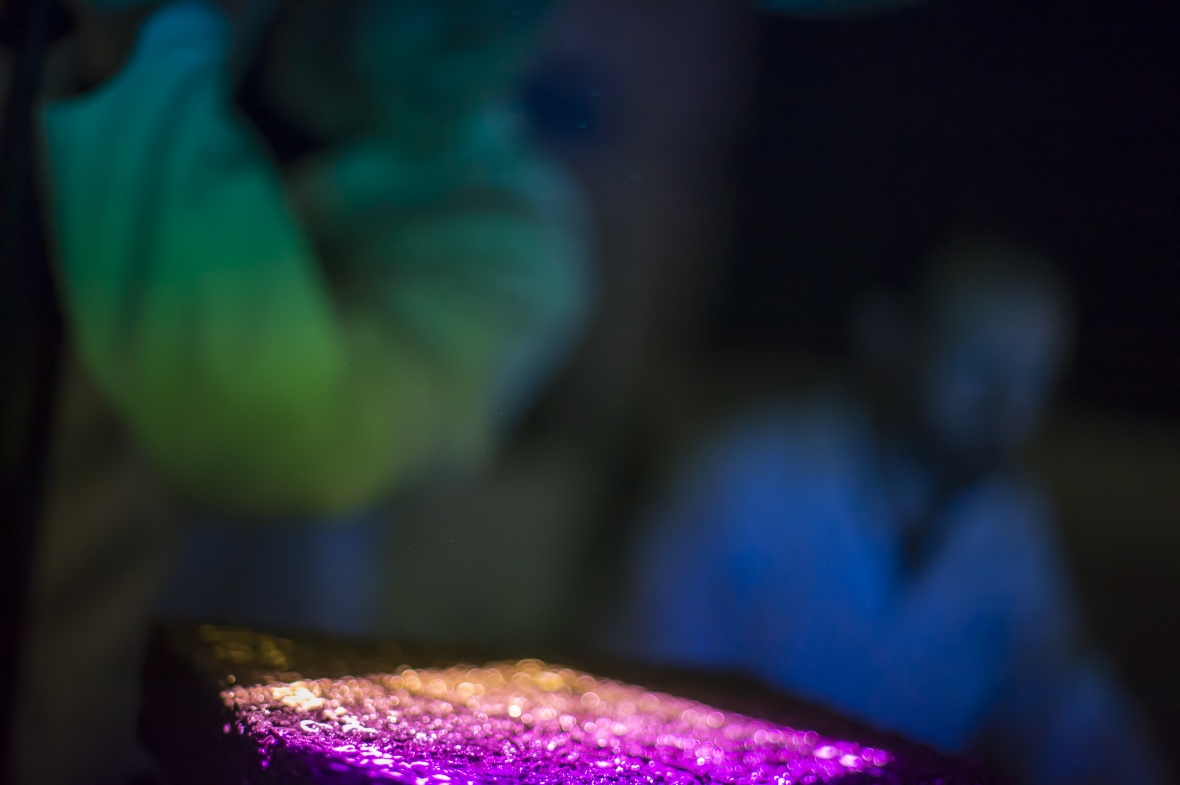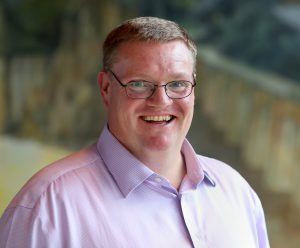
September 19, 2018, by Rob Ounsworth
Royal Academy of Engineering honours University researchers
The Royal Academy of Engineering has recognised world-leading researchers at the University of Nottingham – the School of Computer Science’s Professor Tom Rodden has been elected as a Fellow of the academy, while Professor Sam Kingman and Dr Chris Dodds of the Faculty of Engineering win a prestigious award for a revolutionary process for extracting copper.
Professor Rodden has been elected as a Fellow of the Royal Academy in recognition of his outstanding and continuing contributions to engineering.
He is Professor of Computing at the University of Nottingham and is currently on secondment to EPSRC, the UK’s Engineering and Physical Sciences Research Council, as the council’s Deputy CEO. He is one of 50 leading figures from the UK and around the world to become a Fellow and will add his expertise to the Fellowship of nearly 1,600 world-leading engineers from both industry and academia.

Professor Tom Rodden: “It is a great honour to be elected by my peers to join the academy and I am gratefully to many colleagues at Nottingham and elsewhere I have worked with over my career.”
Election to the Royal Academy of Engineering is one of the highest honours in engineering in the UK, and there are now 11 Fellows at Nottingham including emeritus professors, underlining the quality of engineering research at the University.
Professor Rodden is an international research leader in the fields of human computer interaction, computer-supported cooperative work and ubiquitous computing. His research brings together a range of human and technical disciplines, technologies and techniques to tackle the human, social, ethical and technical challenges involved in ubiquitous computing and the increasing use of personal data. He has developed new methods and techniques, including ethnographic studies and ‘in the wild’ prototyping that are now a standard part of designing interactive systems. He has also overseen the application of these in a wide variety of domains including air traffic control, banking, tourism and disaster response.
One of the leading computer scientists and engineers in the world
Professor Rodden said: “I am delighted to be elected as a fellow of the Royal Academy of Engineering. It is a great honour to be elected by my peers to join the academy and I am gratefully to many colleagues at Nottingham and elsewhere I have worked with over my career.”
Dame Jessica Corner, Pro-Vice-Chancellor for Research and Knowledge Exchange at the University of Nottingham, said: “To be honoured by the Royal Academy of Engineering is a tremendous accolade. As a Fellow of the Royal Academy, Professor Rodden has been recognised as one of the leading computer scientists and engineers in the world. He joins colleagues at the Faculty of Engineering whose dedication and world-leading discoveries continue to have transformative impacts on societies here in the UK and across the world.”
Professor Dame Ann Dowling OM DBE FREng FRS, President of the Royal Academy of Engineering, said: “I am delighted to welcome all our new Fellows to the Academy – together they epitomise the very best of UK engineering. Representing the country’s most innovative and creative minds from both academia and industry, the achievements of our new Fellows highlight the critical role engineering has in addressing major societal challenges and ensuring our readiness for the future. We are very much looking forward to working with them as we continue to fulfil our vision of engineering at the heart of a sustainable and prosperous society.
Meanwhile, the Royal Academy of Engineering recognised a multidisciplinary team of engineers from the University of Nottingham and Teledyne e2v with the Colin Campbell Mitchell Award for developing MicroHammer, a revolutionary process for extracting copper from its ore using microwave technology.
Largest microwave processing system ever constructed
The team, which includes Professor Kingman and Dr Dodds from the University and Dr Ewan Livingstone, Paul Burleigh and David English from Teledyne e2v, combined their skills in microwave technology and engineering to develop the largest microwave processing system ever constructed, capable of processing up to 3000 tonnes of rock per hour.

Professor Sam Kingman: “It is a great honour to receive this award which recognises the contributions of a significant number of people both at the University of Nottingham and at Teledyne e2v.”
Copper is one of the world’s most widely used metals, playing an integral role in many sectors from construction to power generation and transmission. Although global demand is increasing rapidly, with copper a vital material for nearly all electrical devices, the quality of copper reserves is in decline with both the percentage of copper and the size of grains found in ores decreasing.
Current extraction techniques require enormous amounts of energy, with an estimated 5% of the world’s electricity used to fine grind rocks in mineral processing plants. MicroHammer, which uses microwave energy to separate copper grains from the ore, reduces the energy needed to extract copper by over 20% and boosts production by almost a third.
By exposing rocks to powerful microwave energy for a fraction of a second, MicroHammer heats and expands the copper grains, causing them to split from the encasing rock. The microfractures, which are smaller than the width of a human hair, weaken the host rock and make it possible to extract the copper without completely grinding the ore.
Using microwaves to create fractures in mineral ores has been a topic of academic study for several years, but presented real challenges in demonstrating it was possible at a commercial scale in a mining environment.
World-leading solution to help supply societies with sustainable technology
Working with one of the world’s largest metals and mining corporations, Rio Tinto, which funded the project, the team have designed a system that contains and focuses hundreds of kilowatts of microwave energy and can be safely used in the harsh operating conditions of a mine. The demonstration system processes over 150 tonnes of rock per hour, and, using numerical simulation and experimental validation, the team have demonstrated this can be expanded to thousands of tonnes per hour – the scale needed for sustainable commercial use.
Professor Kingman, the project’s academic lead, and Pro-Vice-Chancellor for the Faculty of Engineering at the University of Nottingham, said: “Our collaboration with Teledyne e2v has been the key to unlocking the potential that this technology has offered for decades, but no one has been able to access due to significant technical challenges. It is a great honour to receive this award which recognises the contributions of a significant number of people both at the University of Nottingham and at Teledyne e2v. We are now well placed to take this technology to market and deliver one of the most significant impacts to mineral processing since the development of froth flotation.”
Paul Burleigh, project lead at Teledyne e2v, said: “It’s exciting to be part of a team that has developed a technological solution that will make a real difference in creating sustainability in the supply of materials that underpin economic and social development across the globe. Though receiving the award in person, it’s important to remember that this is on behalf of the wider team who have delivered the innovative steps and engineering solutions to the challenges that have been overcome.”
Dame Jessica added: “At Nottingham, our research addresses global challenges, and the MicroHammer team at the Faculty of Engineering and their partners looked at an issue challenging industries worldwide: how to improve sustainable extraction techniques to keep up with the growing demand for quality copper for use in electrical devices. Their world-leading solution is a breakthrough and is poised to help supply societies around the world with the technology they need for sustainable development.”
Professor Raffaella Ocone FREng FRSE, Chair of the Royal Academy of Engineering Awards Committee, said: “The tremendous amounts of electricity needed to extract copper from low grade sources has left the mining industry in an unsustainable position and in desperate need of a new technological solution. The MicroHammer process developed by the team from the University of Nottingham and Teledyne e2v is a tremendous breakthrough, not just in saving energy but in helping to ensure that copper supply meets global demand. The achievements of the team make them worthy winners of the Royal Academy of Engineering’s Colin Campbell Mitchell Award.”
The Colin Campbell Mitchell award is awarded annually to an engineer or small team of engineers who have made an outstanding contribution to the advancement of any field of UK engineering.
No comments yet, fill out a comment to be the first

Leave a Reply